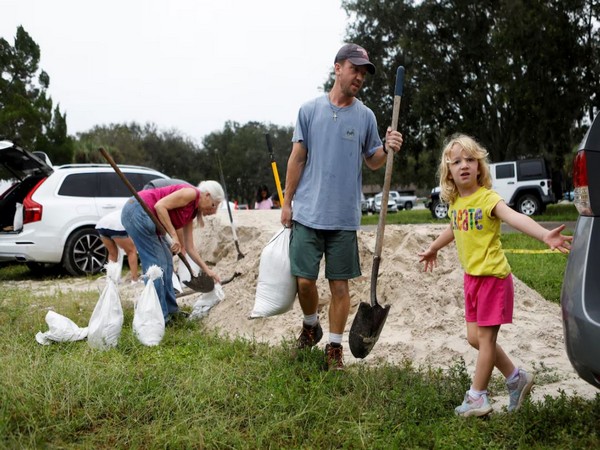Florida [US], October 9: Hurricane Milton barreled toward Florida's battered Gulf Coast as an enormous Category 5 storm on Tuesday, triggering massive traffic jams and fuel shortages as officials ordered more than 1 million people to flee before it slams into the Tampa Bay area.
Milton, which exploded on Monday into one of the most intense Atlantic hurricanes on record, was forecast to make landfall late Wednesday or early Thursday, threatening a stretch of Florida's densely populated west coast that is still reeling from the devastating Hurricane Helene less than two weeks ago.
A direct hit on the bay would be the first since 1921, when the now-sprawling Tampa-St. Petersburg-Clearwater area was a relative backwater. Today it is home to more than 3 million people.
Tampa Mayor Jane Castor warned people against riding out the storm, calling Helene a mere wakeup call.
"If you choose to stay in one of those evacuation areas, you're going to die," Castor said.
In Tampa, Estephani Veliz Hernandez said she and her family were collecting their pets, important documents and their cash before heading to a relative's home further inland.
"We're leaving everything behind. We're just trying to get to safety," she said. "If anything happens - if God says here you go - we're all together at least."
The U.S. National Hurricane Center on Tuesday upgraded Milton back to a Category 5 hurricane, the highest level on the five-step Saffir-Simpson scale, as maximum sustained winds picked up to 165 miles per hour (270 km per hour).
At 4 p.m. CDT (2100 GMT), the eye of the storm was 480 miles (775 km) southwest of Tampa, moving east-northeast at 9 mph (15 kph).
"Milton's wind field is expected to expand as it approaches Florida. In fact, the official forecast shows the hurricane and tropical-storm-force winds roughly doubling in size by the time it makes landfall," the hurricane center said.
The greater size also enlarges the scope of the risk of storm surge to hundreds of miles (km) of coastline.
The hurricane center sees surges of 10 to 15 feet (3 to 4.5 meters) north and south of Tampa Bay, in addition to the ferocious winds and risk of inland flash flooding from intense rainfall.
National Hurricane Center advisory made on October 8
Hurricane Helene left the Tampa Bay area more vulnerable when it hit the Gulf Coast's barrier islands and beaches on Sept. 26, sweeping away tons of sand, knocking down dunes and blowing away dune grass.
That could exacerbate Milton's storm surge, according to Isaac Longley, a meteorologist with the commercial forecasting company AccuWeather.
"There's no gradual slope left to mitigate any of it," Longley said.
Dump trucks have been working 24 hours a day to remove mounds of debris left by Helene for fear Milton could turn them into dangerous projectiles, Governor Ron DeSantis said.
Five-thousand National Guard members have been deployed, with another 3,000 on hand for the storm's aftermath.
Underscoring the storm's threat, President Joe Biden on Tuesday postponed his Oct. 10-15 trip to Germany and Angola to oversee storm preparation and response, the White House said.
Biden urged those under evacuation orders to leave immediately, saying it was a matter of life and death.
Source: Fijian Broadcasting Cooperation

